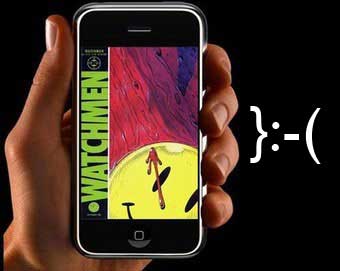Why Definitions Matter
March 25th, 2009
“…Goldman started with a definition of what comics are: stories told with words and pictures”
[SXSW “Comics on Handhelds” panel – link via James Burns]
Dan Goldman is, I’m sure, using the above in the spirit of opening minds to comics’ range and flexibility. But under the image of the Watchmen “motion comic” it offers a grim reminder of how our conception of comics now can point us down some dark roads in the near future.
I don’t doubt that a lot of hard work and earnest creativity went into the building of the WMC, but if the future of comics is cheap pseudomovies on cell phones, you can count me out.
Posted in Mobile Comics, Press















Couldn’t agree more, Scott. Though I’ve always been opposed the idea of adding motion to comics (something I still doubt to really be possible), I was looking forward to giving the Watchmen motion comic a chance — because, well, it’s the Watchmen. Then I saw the trailer, and it just hurt my eyes. I doubt I’ll ever watch the whole thing (I would have considered downloading the first episode, but iTunes clearly doesn’t want downloadable customers in my country). The word «motion comic» is misleading. The WMC has nothing to do with comics — it’s a half-hearted attempt to make an animated cartoon where both the animation and the voice acting could have been done better by the average Newgrounds visitor.
A Norwegian university student was experimenting with creating comics for the PSP last year, and I think what he made looked pretty good — sadly, his sample appears to no longer be online, otherwise I would have linked you to it.
Here’s to the future of comics hopefully keeping in mind what comics *are*.
I’m 100% with you, Scott; I see motion comics as stripping out the magic of the comics’ language without trading it for a full “animation” experience, becoming a kind of halfway hybrid not unlike those Marvel “moving lips” cartoons from the 60s.
The WMC question was raised early on in our panel, and we amended our definition of “digital comic” to one with neither animation nor sound, relying solely on the reader-imagined SFX/soundtrack/ambience as they engage with the material. Clearly If you hit “play” on a “comic”… it ceases to be a comic, moving from a spacially-engaged reading experience and becoming a temporal (passive) viewing experience instead. This goes back to Understanding Comics, where you’d drawn that dividing line between comics and cartoons, and that’s never been clearer than here.
I’ve had many long talks with friends about what works/doesn’t taking comics from page to screen to pocket-sized screen, how the “magic” of the comics experience lies in the gutters between panels… so our panel spent a good deal of time on that point, with the “panels vs pages” question of how to best present comics on smaller hardware with both adapted and created-for-handheld works.
A full podcast of our panel should be available any day now from SXSW, and I’ll have that available likety-split when it is to let this conversation continue, which is the point.
My thanks to you Scott for calling out the WMC issue as it’s a sticking point for a lot of us creators/readers, and made it necessary to set a definition of comics for the panel right out of the gate to frame our discussion.
Thanks for checking in, Dan!
I can tell that it was actually a good, far-ranging panel that considers many of the important issues. Would love to link to the audio when it’s available. It’ll give me a chance to offer your other key quote: “What’s best for the device isn’t always what’s best for the storytelling”—Amen to that!
I don’t think Goldman has thought very carefully about the definition he offers. We could easily make a list of “stories told with words and pictures” that no one would call comics.
Let’s see: Carroll and Tenniel’s Alice in Wonderland; Walt Disney’s Alice in Wonderland… Fargo; Breakfast of Champions…
I’m not opposed to hybrid, medium-crossing works of art. They can be exhilarating. And the territory where media or genres nestle up to each other is always pretty interesting. But I don’t see the sense in writing a definition that doesn’t even define the thing you’re referring to.
In Dan’s defense, a broad brush like that can sometimes jump start a conversation more effectively than the kind of geeky scalpel-like phrasing you’d need to exactly define comics.
Open a panel with “Comics are juxtaposed pictorial and other images in deliberate sequence” and half your audience will nod off and the other half will head for the exits.
I understand why he phrased it the way he did. It was just the proximity to that image of the WMC that got me thinking dark thoughts. 😉
No matter how cheaply it’s made, once the pictures start moving, it is animation. I’m a total hardliner about this. No motion, ever.
I look at a few webcomics that have used animated single panels as part of a gag and since that’s not the entirety of the experience, I’d consider that “comics with an animated panel.” The whole of a series or even a single strip doesn’t automatically become something else due to the content of a single panel anymore than it would become “prose” due to a text passage.
But yeah; as far as fully animated “comics,” Just Say No.
I think bits of looping animation can work. Ditto for looping, ambient sounds and music.
I think that looping animation was handeled best by Kid Radd.
http://www.kidradd.com/
Oh, man. That takes me back.
You do ask the hard questions, Scott. I was thinking something similar while watching Watchmen. Went to the early show, cost 5.50. Terry Moore’s new book, Echo, cost 3.50. I was thinking, you have to love the comics form, because if you don’t love it enough there are more immediate mediums with greater frills for the same amount of money. I just hope as we go forward that enough of us want the original comics form more than whatever tangential form springs from it.
I feel that when it comes to things like motion comics and looping animations at what point is it no longer a comic? At what point is it just a cartoon?
I haven’t read this version of Watchmen, but ‘motion comic’ sounded like it was to comics what ‘Synchrovox’ was to animation.
Dude, Scott McCloud Space Angel so used that technique!
I kinda like the idea of enlarging text when it’s browsed over; if nothing else, it’s less distracting than the motion comics.
Oh man, it’s like TLC winning “Best HipHop Group” all over again.
Regarding the Watchmen Motion Comic:
I thought it was fun, but not a new form of comic. As someone who’s done television graphics for the last 20-some years, I recognized it for what it was – an animatic.
Hey Scott,
I was there, and I don’t think he said that this Watchmen iPhone thing was a comic. It was more of a question….Is this a comic?
Also, there was ample bandying about of your name, your books, the importance of what happens between the panels (closure), micropayments (!!!), etc. Definitely a thought provoking panel.